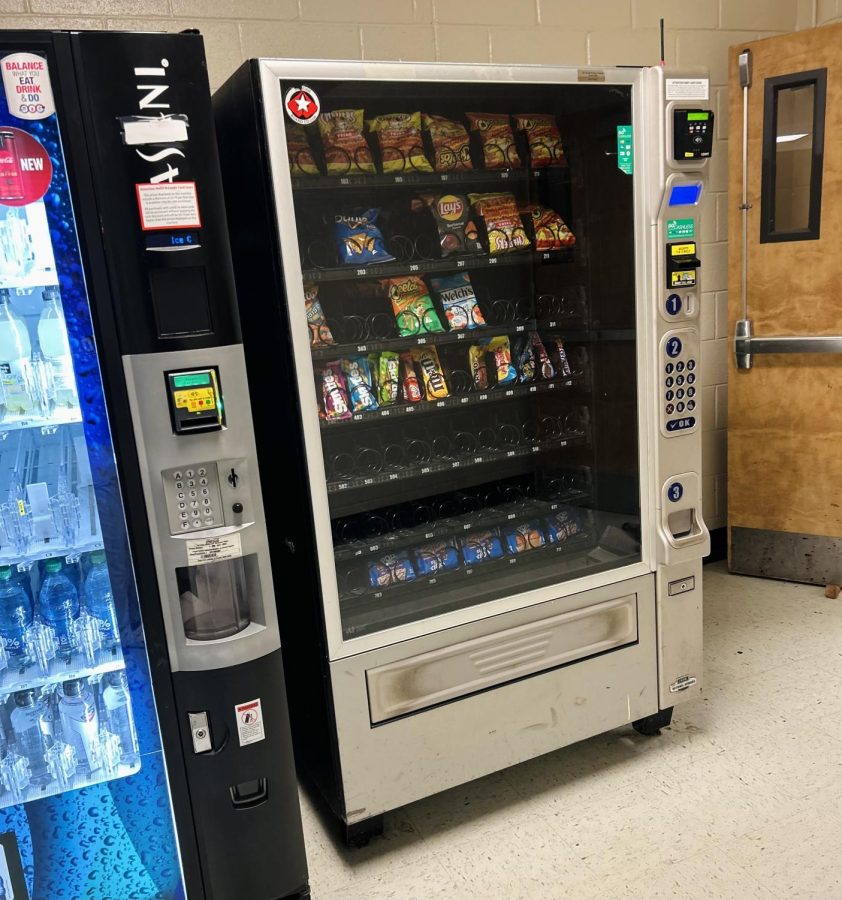The unhealthy reality of school vending machines
Schools continuously fill their vending machine with a series of unhealthy snacks that unintentionally affect students for the worse. While a sweet or salty snack once every blue moon does not hold long-term effects, the poor dietary choices that the school promotes result in obesity; these unacceptable eating habits can cause inadequate performances in both the school and work environment.
March 7, 2023
Every day, NC vending machine operators refill the treat-filled appliances with delicious snacks that fill the bellies of hundreds of students per day. A bag of Doritos or a Honeybun every once in a while can serve as the perfect snack to cheer someone up on a rough day or hold them over until lunch; however, vending machine snacks generally remain detrimental to students’ diets and well-being. While their taste buds may say yes, their bodies say no to the high levels of sodium and fat they intake on a regular basis.
Although the school supplies vending machines as a source of revenue, healthier alternatives exist that can satisfy students’ hunger in the same light that a Little Debbie snack could. According to a study, students who eat or drink vended food and beverages carry significantly higher sugar intakes and lower dietary fiber, vitamin and iron intakes than kids who do not. The Healthy, Hunger-Free Kids Act, signed and enforced by the Obama family in 2010 still requires school cafeterias to serve high amounts of fruits and vegetables, along with lower-fat snacks in an attempt to reduce childhood obesity and promote healthier diets. For instance, the NC cafeteria serves low-fat, whole-grain Pop-Tarts, while the vending machine Pop-Tarts appear similar to the regular ones an individual can purchase from the grocery store. The vending machines stand as counterproductive to Obama’s policy because students can then turn around and buy unhealthy snacks whenever they please.
“I used to buy vending machine snacks every day, but lately I’ve been packing my own snacks because it forces me to eat better. Sometimes, I’ll go get Skittles or something because I’m in the mood for something sweet, but I saved so much money when I stopped buying snacks every day. Plus I run track, so I have to eat healthier or else I’ll feel sluggish and don’t reach my fullest potential,” magnet senior Brooklyn Bolden said.
While several would argue that students can easily pack their own unhealthy lunches from home, replacing the snacks in the vending machines with healthier options will drastically reduce the amount of unhealthy food buying students partake in. Not everyone stands in a situation where they can bring items from home, and a majority of students only purchase vended snacks because the school strategically places them in the halls where pupils constantly drift toward them on the way to class. However, out of sight, out of mind. A variety of snacks such as Nutri-grain Bars, Skinny Pop, baked chips, Chewy Bars and Veggie Straws carry lower contents of sodium, fat and sodium than the available ones, but remain appetizing to several.
“I think that if the school replaced the vending machines with healthier items, they wouldn’t really have much to lose because I think people would still buy them and I think it would definitely be a nice change,” Bolden said.
Although school machines can continue selling minimal amounts of unhealthy foods and candy to fulfill students’ guilty pleasures, the operators should replace a bulk of the spaces in the machines with healthier options. The long-term effects will display themselves in students’ productivity, physical health and performance in school.







